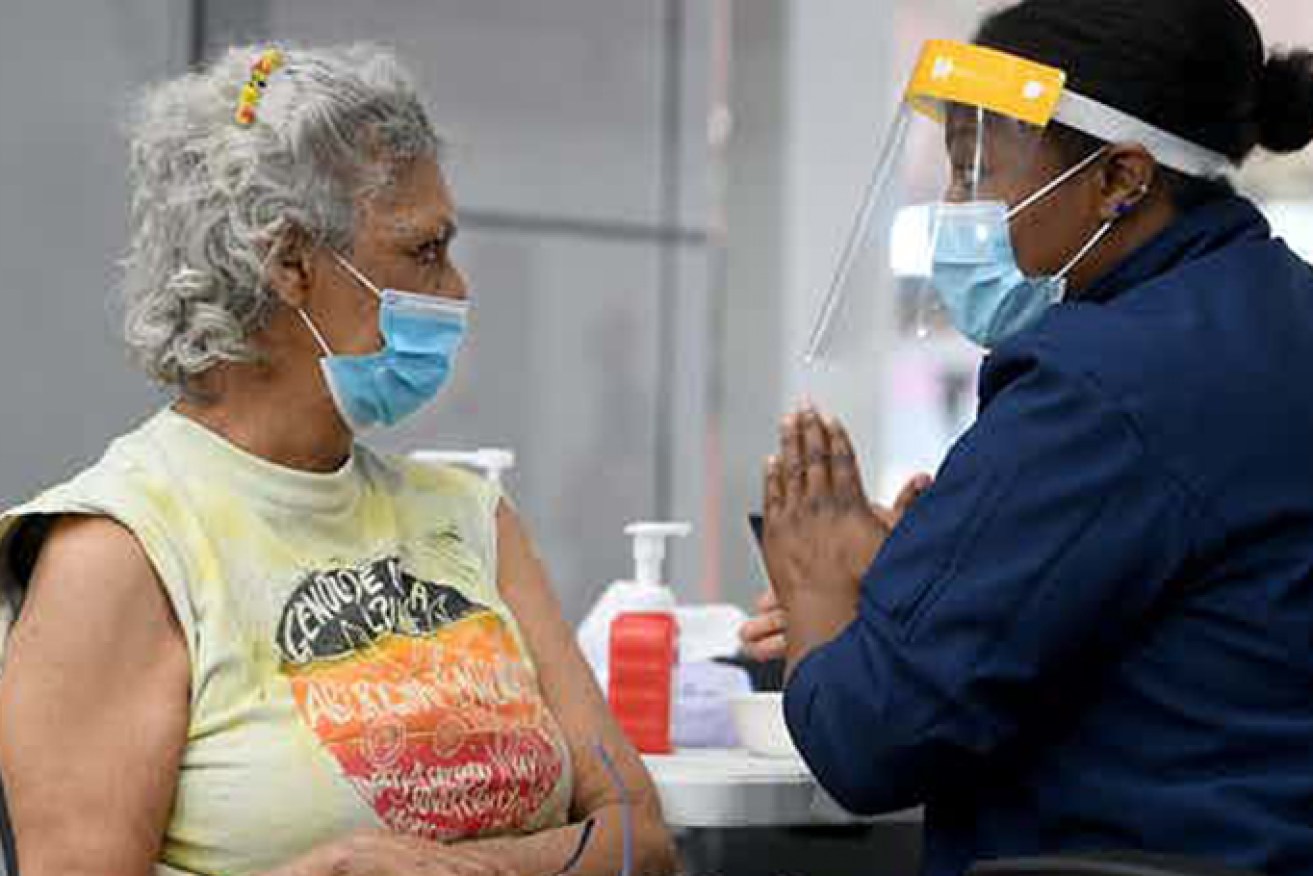Outbreak fears for indigenous communities as jab rates remain low
COVID-19 vaccination rates are perilously low among indigenous Queenslanders, triggering concerns a big Delta variant outbreak in the Sunshine State may cause widespread severe illness in First Nations’ communities with high rates of chronic disease.

Image: Dan Himbrechts/AAP
A Queensland Health analysis, obtained by InQueensland, indicates just 24 per cent of the state’s Aboriginal and Torres Strait Islander population aged 16 and older are fully vaccinated and 36 per cent have had one COVID shot.
That compares with Queensland as a whole where 41.8 per cent of residents have received two doses of the vaccine and 60.3 per cent have had their first jab.
Federal Health Department COVID data shows key Queensland Aboriginal communities, such as Yarrabah, near Cairns, and Cherbourg, 250km northwest of Brisbane, have among the worst vaccination rates in Australia.
New figures released late Monday reveal 14.5 percent of Yarrabah residents aged 12 and older are fully vaccinated for COVID-19 and 28.1 per cent have had their first dose.
In Cherbourg, only 18.1 per cent of residents have received two doses and at Aurukun, on the western side of Cape York, 19 per cent of those eligible are fully vaccinated. That’s well short of the national target of 80 per cent of eligible Australians.
But some Queensland Indigenous communities are outperforming the rest of the state.
At Pormpuraaw, about 170km south of Aurukun, double COVID vaccinations are at 77 per cent of residents aged 12 and older, a turnout described by the Torres and Cape Hospital and Health Service Chief Executive Bev Hamerton as “magnificent”.
“I want to thank the community and its leaders for getting behind the vaccination program so solidly and achieving this incredible result,” she said.
COVID vaccination rates are also relatively high in the Torres Strait, where 67 per cent of the eligible population has received a first dose and 52 per cent of residents are fully vaccinated.
Queensland Health’s analysis shows vaccination rates among First Nations’ people also vary widely between age groups.
For example, the coverage among indigenous Queenslanders aged 40-49 is about half the general population, whereas for those aged 70 and older, rates are on par with Queensland as a whole.
James Charles, the newly appointed Director at Griffith University’s First Peoples Health Unit, said low vaccination rates among Aboriginal and Torres Strait Islanders needed to be addressed “pretty quickly”, given high rates of chronic disease.
“We’re very vulnerable in that sense – people with chronic disease are more likely, unfortunately, to be hospitalised if we do get COVID,” Prof Charles said.
“If COVID was to get into a confined community, particularly with a high percentage of unvaccinated people, it could be a real tragedy with terrible consequences, especially with those high rates of chronic disease.”
Charles, who is on the Indigenous Allied Health Australia Advisory Board for COVID-19, said Queensland had an opportunity to improve vaccination rates among First Nations people before the state experienced a large Delta outbreak, such as those occurring in Victoria and NSW.
He called for more culturally appropriate promotion of the vaccine and for the use of local champions to encourage Aboriginal and Torres Strait Islander people to get vaccinated.
“There is some mistrust because of things that have happened in the past,” he said.
“Because of that lack of trust, people don’t rush into things like this. I think governments and organisations need to get more Aboriginal and Torres Strait Islander people involved with promotion and on the ground with delivering vaccinations.”
Queensland Health said it was working closely with First Nations’ communities to provide “collaborative, community-led activities where possible to enhance access to the vaccine and increase vaccination”.
“We are working to engage community leaders to encourage vaccinations, as well as investigating vaccination opportunities as part of existing health activities, such as annual free health checks,” a QH spokeswoman said.
“We have also developed a range of targeted local communications and activities for First Nations communities.”
She said that included walk-in clinics specifically for First Nations people staffed by First Nations people.












